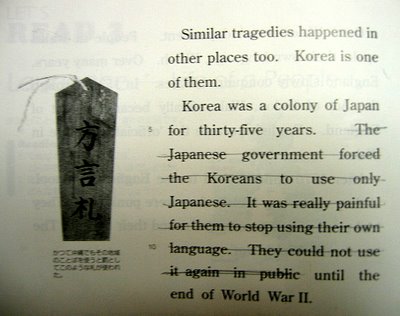Aside from Prime Minister Koizumi’s yearly pilgrimage to Yasukuni Shrine, there's nothing that embitters Japan’s neighbors more than its Ministry of Education’s approval of textbooks. Every few years when an update is due, a renewed uproar ensues accusing Japan of whitewashing its role in history. Last year was one of those years.
Although I teach in public schools, I’m not proficient in Japanese, and never thought I’d witness the controversy first-hand. That is, until I was modeling dialogue for a lesson about “Language – Life of a People.” It was the last lesson in the 9th grade English textbook, and discussed how after 1870 the Welsh were forced to use English in school, and were punished if they didn’t. The next example hit closer to home by bringing up Japan’s restricting the use of Korean during its occupation of the peninsula. The teacher stopped me in mid sentence. Was I speaking English wrong? It turned out that the government-approved textbook (used in all of Tokyo’s public English classrooms) had been gussied up (I mean, updated) just after publication. I was reading from the old version. Contrast it with new one below:
The teacher stopped me in mid sentence. Was I speaking English wrong? It turned out that the government-approved textbook (used in all of Tokyo’s public English classrooms) had been gussied up (I mean, updated) just after publication. I was reading from the old version. Contrast it with new one below:
“…Korea was a colony of Japan for thirty-five years. Korean school children had to learn Japanese as the ‘national language.’ Later, Korean language classes become optional. It was really painful for them. This system lasted until the end of World War II.”
You be the judge.
Tuesday, June 06, 2006
Editing History
Posted by
ジェフリー
at
11:40 AM
![]()
Labels: teaching (general)
Subscribe to:
Post Comments (Atom)



1 comment:
Wow, didn't think that this still happened... How do you say 'garlic-eater' in japanese?
Post a Comment